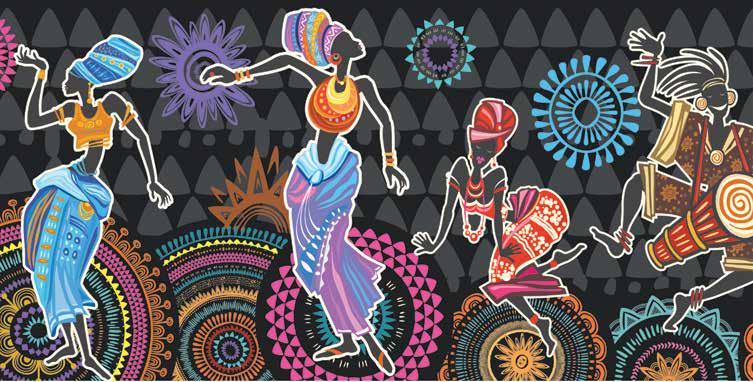
3 minute read
fit body
SACRED DANCE
Moving into Divine Energy
by Marlaina Donato
Heart-healthy dancing of all types is known to promote overall physical and mental health. When they are spirit-infused, forms like African, Middle Eastern, ecstatic and yoga-inspired kundalini dance offer us the opportunity to stay in shape while also fortifying the body’s intrinsic life force. Classes in these styles of dance, which are most often conducted barefoot, draw upon a deep cultural well and include the infectious heartbeat of live accompaniment. Just about anyone can find their own blissful groove when going with the flow is the focus. “In class, I choose to emphasize the feeling more than the step itself. The goal is always to get a spiritual release,” says Darian Parker, a Brooklyn-based West African dance teacher, professor and choreographer. “I always encourage my students to privilege ‘having a good time’ over succumbing to self-criticism from not perfecting a step.”
Modern Moves, Ancient Roots
There are more than 3,000 ethnic groups on the continent of Africa, and each dance style has a purpose that is defined by its unique history.In the West African tradition, dances are designed to heal the individual and from the broader perspective, restore community. Parker, a faculty member of Cumbe: Center for African and Diaspora Dance, in Brooklyn, celebrates the culture and art of the Mande people. “In short, Mande dance trains your spirit just as much as it trains your body,” says Parker. “In many Mande cultures, the ground is thought to be the habitation of our ancestors, who are thought to animate our bodies when we dance. In this way, you can think of dance as a ritual technology that renews our connections with those who came before us.”
While an African dance class encourages high energy and joyous expression, ecstatic dance can be a portal to self-discovery and connectedness. Springboarding from ancient societies worldwide, modern ecstatic dance is freeform and hallmarked by trance or tribal beats. “Ecstatic dance has offered me a portal to my subconscious, my spirit, my deep knowing. It’s a way to, as Gabrielle Roth, the creator of 5Rhythms, put it, ‘Get out of my head and into my body,’ and in my body there is wonderful wisdom,” explains Heidi Sheldon, a seasoned ecstatic dancer and licensed counselor in Stroudsburg, Pennsylvania. “Your spirit knows what to do when it hears and feels the rhythms. You just need to allow your body to follow.”

Middle Eastern dance is comprised of many dance styles—folk and tribal, classical and most widely known, belly dancing. In ancient times, the latter was practiced in rituals for fertile harvests and women’s fertility, including physical preparation for childbirth. In 2017, a pilot study published in the Journal of Bodywork and Movement Therapies showed that belly dance improves depressive symptoms, fatigue and quality of life in women with breast cancer.
“Belly dancing is a tantric form of dance that empowers women to release shame and accept and love themselves and their bodies just as they are. The movements open us to pleasure and sensual bliss in our very own skin. In this way, it is very healing and therapeutic,” says Banafsheh Sayyad, a Persian dance artist and founder of the Dance of Oneness Academy, in Los Angeles. Sayyad’s movement, a fusion of Persian and Middle Eastern dance, flamenco, contemporary dance and meditative whirling, is deeply connected to an ancient feminine ethos.
As a teacher, she brings the Sama—the dervish (pronounced “darvish” in Persian) dance of the Sufis historically reserved for men—into the hands of women.“In the traditional Sama, the right arm is extended up toward the sky with the palm facing up,” she says. “The left arm is extended out with the palm facing down toward the Earth. In so doing, you transmit and emanate the light you’ve received into the world through your heart. So, this dance is about becoming a channel for light and love in the world.”
In essence, stepping into any dance class can be good for the soul. Sayyad reminds us, “Every movement and dance style, if done with the intention of surrendering one’s sense of separateness into an experience of the greater or dissolving one’s identity as a drop of water into the greater ocean of oneness, can be sacred.”

Marlaina Donato is an author and recording artist. Connect at WildflowerLady.com.
Plymouth










